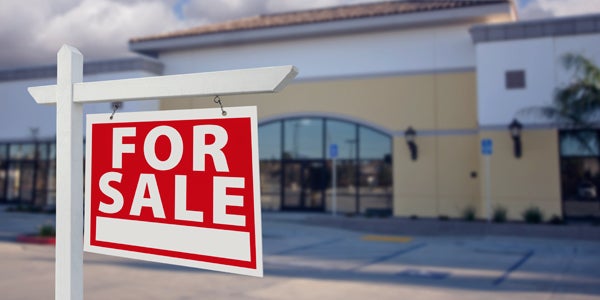Owning or renting: which is actually a better strategy during inflationary times? With inflation climbing, you should consider all the factors associated with buying property as you navigate the CRE market. Read more as we delve into this issue.
In an attempt to curb inflation, the Federal Reserve has embarked on a series of aggressive interest rate hikes over the course of 2022. The Fed raised rates by half a percentage point in May, followed by historically high three-quarters of a point hikes back-to-back in June and July. Fed officials have signaled that they expect to reach 3.25–3.5% total by the end of the year. As debt becomes more expensive, business leaders must do whatever they can to control the cost of goods sold.
Commercial real estate (CRE) is a hot market. But owners and operators must align their business finances with the increased cost of funds. Owning or renting: which is actually a better strategy during inflationary times? After all, the money you invest in CRE affects your cost of goods sold and—ultimately, your bottom line.
How are rising rates impacting the CRE sector? And what moves can you make to stay on top?
A Two-Year Forecast

Current inflation and interest rates are affecting many prospective CRE buyers, as many want to buy today—lest debt becomes prohibitively expensive in the future. For business owners, reasonable CRE costs are, of course, linked to keeping the overall cost of goods sold under control.
NAR Chief Economist Lawrence Yun foresees a positive future for CRE markets, despite rising rates and inflation. While speaking at the Commercial Economic Issues and Trends Forum, Yun expressed optimism for the CRE market, saying, "The industrial sector is booming, retail is turning positive, the hotel industry is recovering, apartments are doing very well, and rents are rising in all commercial sectors." Keep in mind, while this may be positive news for those investing in CRE, the businesses looking to rent or buy space should keep an eye on such climbing prices.
What exactly might we expect in various industries? Pandemic-era side effects such as the shift to just-in-case manufacturing is putting industrial and storage sector real estate in higher demand, as companies aim to increase their wholesale inventory buildup. At the same time, office space may become increasingly more available as more employers shift to hybrid and remote schedules.
Prudent Moves That Lower Expenses

Knowing what experts are predicting may be half of the battle, but what practical moves can business leaders explore immediately? Consider the following strategies.
Consider a Hybrid Set-up Where Employees Are in the Office Part-Time
Office vacancy rates increased to an average of 12.3% in Q1 of 2022, riding the wave of hybrid and remote work trends. Even as return-to-work initiatives continue, more and more companies have realized the benefit of hybrid and remote setups. Furthermore, their employees have grown accustomed to the work-life balance—and numerous studies show how little they want to return to the office.
Instead of investing in large-scale office space, consider downsizing to a smaller building to accommodate a fraction of your workforce. Determine which jobs can be done remotely or in a hybrid setting, and shift those employees to a work-from-home model. Then, assess how much office space you'll need to accommodate workers in the building. The money saved from downsizing will reverberate in your cost of goods sold.
Practice More Objective Price Evaluations When Purchasing
Assessing CRE value isn't quite as objective as residential value. Apartment buildings, industrial complexes, retail stores, and owner-occupied businesses come with more X-factors and intangibles.
Maintenance costs vary drastically between industries, and commercial values usually depend on uncontrollable elements like the current market price against fewer comparables. With little room for subjectivity in these tight times, what approaches can business leaders take to be more objective regarding their CRE?
- Cost-First: Weigh the cost of buying the property against building it from scratch.
- Market-First: Evaluate recent sales of comparable properties. While more common in residential real estate, the same principles apply to CRE.
Evaluate Your Commercial Real Estate Expenses

It goes without saying that you have two options when buying CRE: pay for it in full with cash or finance through a loan. Each strategy comes with its pros and cons, though variable rate loans may stir more reason for concern as interest rates climb.You can also rent property, which allows you to renegotiate agreement terms as circumstances change. Determining whether buying or renting is best hinges on several factors, including cash outflows, recurrent expenses, tax status consequences, and rising interest rates.
Let's dive into some strategies for businesses looking to buy and how they can maximize revenue once they own CRE.
Do Your Due Diligence
Proper due diligence is a crucial first step. Conduct as much research as possible into the site, city, and state before purchasing CRE.
Leverage the Pros of Buying
Buying CRE comes with more risk. Still, owning an appreciating asset outweighs the pros of renting one. Buying CRE allows you to build equity in the property while even giving you the flexibility to rent part of the building to someone else if necessary.
Refinance
Interest rates won't be this high forever. Keep your eye on fluctuating rates and refinance when they dip to a favorable level. You'll lower your monthly repayment figure and free up cash quickly.
Make the Right Evaluations From Now
The remainder of 2022—into 2023—will challenge your business. Increasing rates will affect the cost of goods sold, and you must stay prepared for both threats and opportunities.
Buying or renting CRE is an important decision with significant impact in meeting your long-term strategic goals. One made easier with the help of a trusted financial partner like Arizona Bank & Trust, a division of HTLF Bank. You'll need to consider all the factors associated with buying property as you navigate the CRE market. From retail to office space, every industry comes with a bevy of pros and cons in this economic climate.
Get in touch with Arizona Bank & Trust, a division of HTLF Bank to speak with a commercial banker with deep CRE insight. Together, you can craft an actionable plan for procuring CRE and minimizing your cost of goods sold in the face of rising rates and inflation.









